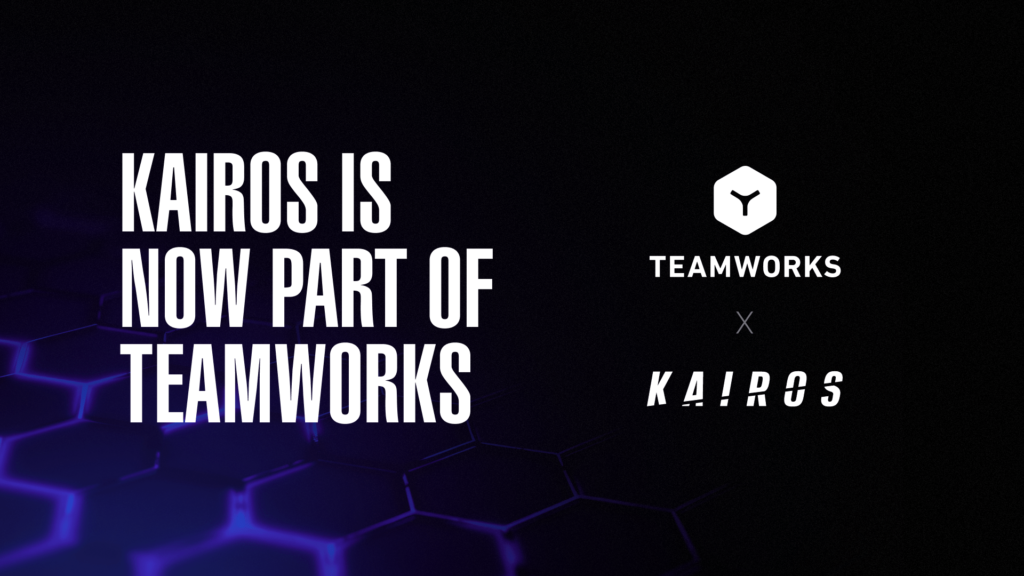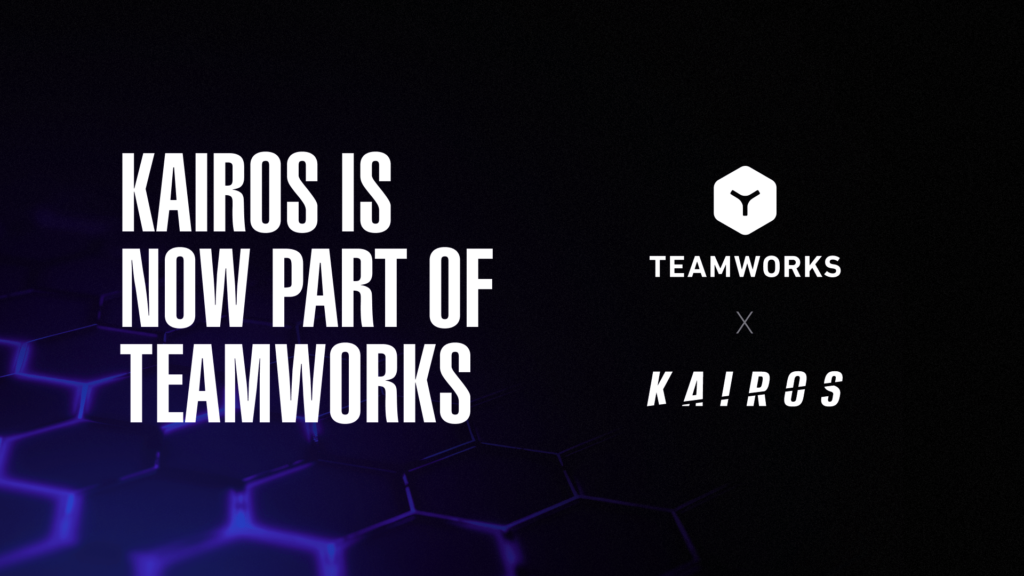Andrew Trimble, Kairos CEO, expands on why joining forces with Teamworks accelerates innovation for pro customers globally.

It is with great pleasure and excitement that myself and Gareth share some news with you today. We are delighted to inform you that Kairos has been acquired by Teamworks, the renowned leader in the sports industry.
As an international rugby player, I was always fascinated by ways that I could improve my offering for the teams that I represented. One of the most significant issues I encountered was the distraction caused by multiple WhatsApp groups, emails, and whiteboard appointments. I was always concerned that I’d missed some vital piece of information!
High-performance athletes are spikey! They’re very good and passionate about one thing and that’s performing! So…. let’s find a way to allow them to just worry about the game at the weekend!!
While we’re at it, let’s allow staff and coaches to deliver key information and updates to players in an efficient way and give them the assurance the information has been engaged with.
A compelling thesis behind Kairos was established, and Gareth and I went to work building the solution.
When we launched Kairos to the English football market in 2021, we quickly began working with some of the biggest sports brands. We discovered additional intangible benefits Kairos users were experiencing, including increased accountability and an improved team culture. We continued to iterate the product at pace with an amazing team Headquartered out of Belfast, Northern Ireland. Our whole team became experts at intimately understanding the environments of pro teams.
Although we didn’t realize it, from 2021 onwards, Kairos was already partnering with Teamworks. We were collectively informing pro sports teams worldwide that a dedicated communication solution was a ‘must have’ to harness high performance. Together, Kairos and Teamworks now work with the vast majority of teams in the most significant leagues in the world, learning together as the needs of teams constantly evolve.
The acquisition by Teamworks is a very exciting opportunity to join forces with one of the biggest companies in sports tech and ultimately impact the offering to benefit the broader market. Joining forces with Teamworks will open up unparalleled opportunities for growth, innovation, and more overall impact. Their extensive knowledge and strong industry presence will empower us to amplify further the value we deliver to our customers and partners. Together, we will continue shaping the future of sports technology and revolutionize the way professional sports teams operate.
We want to extend our heartfelt gratitude to each and every one of you for your constant support, loyalty, and partnership. We are immensely excited about this acquisition and its possibilities for our collective future.
We would say one thing to our team and customers. We have built a strong product and company, and now, we look forward to leveraging our combined strengths to achieve even greater heights. Fasten your seatbelts – we’re not leaving the theme park – we’re building a bigger rollercoaster!!
One of the most exciting elements about joining Teamworks is the opportunity to learn from and collaborate with the brilliant people at the company. The big question is, ‘What’s next for the Operating System for elite sports?’ Having looked behind the scenes and discussed Teamworks plans for the future, it’s a future we want to be part of and feel with myself, Gareth, and the team at Kairos in the mix, we can make it even more exciting!
Thank you, and let’s embrace this next chapter together!
Andrew
Teamworks Acquires Kairos

Teamworks Acquires Kairos
Teamworks’ acquisition of Kairos represents a significant investment in the Professional Sports market.
DURHAM, NC – [January 17, 2024] – Teamworks, an enterprise SaaS company serving elite sports and tactical organisations globally, has announced the acquisition of Kairos, a communication and messaging software for professional sports. This acquisition is the next step in Teamworks’ journey to transform sports technology and represents a significant investment in the professional space.
Each company has made an indelible mark on the operations of professional sports organisations. Teamworks currently works with 200 pro organisations around the globe, having entered the market more than a decade ago. In the past three years, Kairos has built an extensive customer roster of over 100 organisations, primarily in global football and rugby.
The vision for The Operating System for Sports™ remains the same. Together, Teamworks and Kairos plan to create a unified and enhanced experience by incorporating the best of Kairos into the Hub product, and continuing to integrate the full suite of best-in-class tools within the Teamworks Operating System.
“When we set out to revolutionise sport through technology, we knew we couldn’t do it alone. We’ve acquired companies with visionary leaders and like-minded individuals to help us build the future of sports. Kairos is the next great company to join us on this mission.” said Zach Maurides, Founder and CEO of Teamworks. “With our combined expertise, additional resources, and a unified strategy, we’ll accelerate innovation and our development of an integrated operating system for elite sports organisations.”
As part of this acquisition, Teamworks welcomed twenty new Kairos employees who will focus on product innovation specifically for the professional sports market. Teamworks is also excited to welcome Kairos founders Andrew Trimble and Gareth Quinn. Trimble’s distinguished rugby union career includes representing Ireland internationally for more than ten years and whose proven approach to empowering holistic sports performance will help guide future product development for the pro sports market.
“The decision to join Teamworks is a strategic move to align ourselves with the leader in sports technology, and one that shares our vision,” said Trimble. “Teamworks’ comprehensive operating system allows us to continue building and innovating for our pro sports customers on a solid and integrated foundation. It also allows our customers to adopt new purpose-built products faster within a unified platform.”
Teamworks’ footprint within the professional space now includes 300+ organisations across 15+ countries. Most notably, 91% of NFL, 85% of English Premier League, 83% of NBA, and 80% of top-ranked Men’s National Rugby teams use at least one of Teamworks’ 12 products.
About Teamworks
Teamworks is the proven operating system for high performance, powering more than 6,000 sports, military, and public safety organisations worldwide. Available on a centralised, integrated platform, the Teamworks’ product suite provides specialised applications to support recruiting, development, management, individual branding, and community building. Based in Durham, North Carolina and founded in 2004, Teamworks continues to expand its global presence with employees across eleven countries. Visit teamworks.com to learn more.
About Kairos
Kairos is a Team Operations & Communication system, trusted by elite teams worldwide. This comprehensive platform seamlessly integrates team planning, daily communication, and player management, streamlining essential functions into one centralised system. Visit Kairostech.io to learn more.